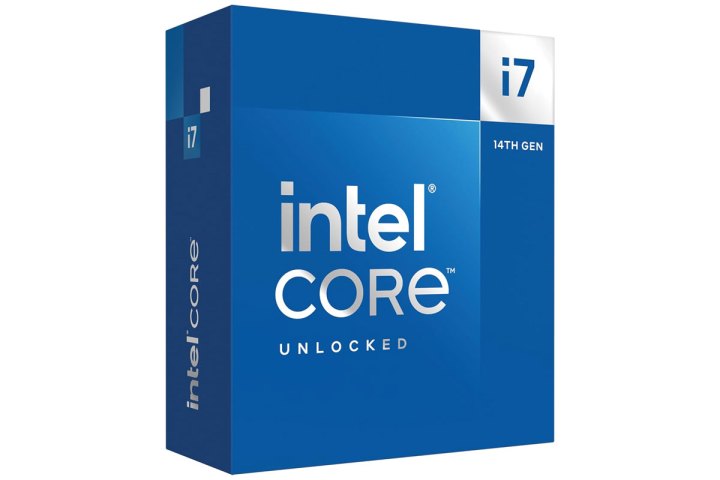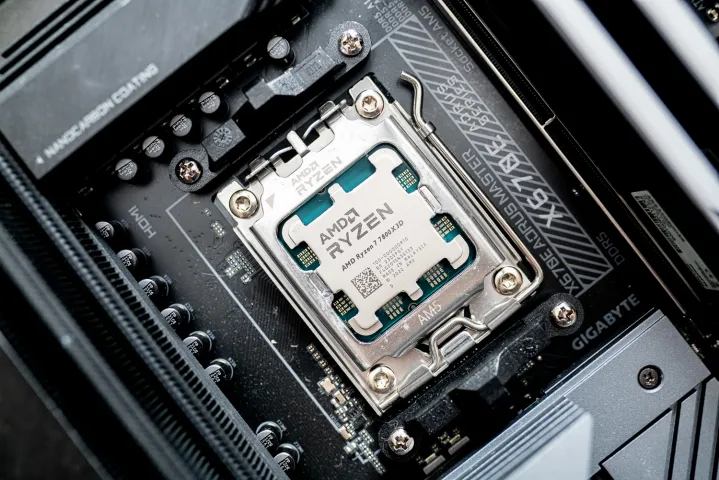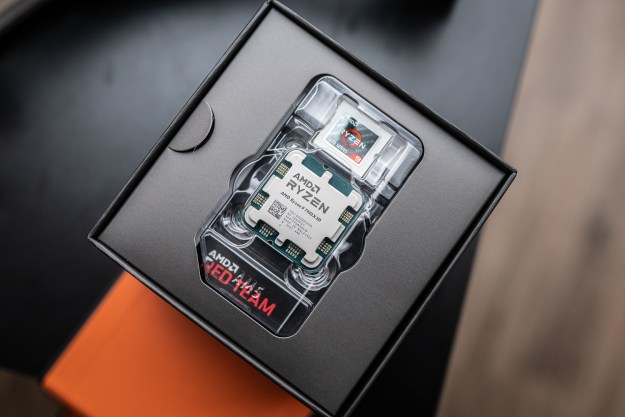
If you want a powerful processor, you can get a lot for your money at around the $400 mark. Both AMD and Intel have stellar options that offer high performance in gaming and productivity, and that even compete with the very best of the best that cost hundreds of dollars more. The Ryzen 7 7800X3D and Core i7-14700K have lots of cores, super-high clock speeds, and boatloads of cache. Here’s how they stack up in a classic head-to-head comparison of the best CPUs under $400.
Pricing and availability
AMD launched the Ryzen 7 7800X3D in April 2023, just over six months after the debut of the rest of the Zen 4 generation of processors. It debuted with a price tag of $450, though that initially fell to $400, then to around $370, which is the price at most retailers at the time of this writing. Stock remains widely available, despite it being one of the most popular processors available today.

The Core i7-14700K debuted in October 2023 along with the rest of the initial 14th-generation lineup. It had a recommended retail price of $410, which has remained mostly stationary since then, but has come down slightly to just under $400 at most retailers at the time of this writing. It remains widely available at a range of retailers.
Specs
| AMD Ryzen 7 7800X3D | Intel Core i3-14700K | |
| Cores/threads | 8/16 | 8P+12E/28 |
| Base clock | 4.2GHz | 3.4GHz |
| Boost clock | 5.0GHz | 5.6GHz |
| L2+L3 cache | 104MB | 61MB |
| TDP | 120W | 125W/253W |
| Price | $370 | $400 |
The Ryzen 7 7800X3D isn’t the unicorn of its generation like the 5800X3D was, but it is certainly a standout. Built on the same platform as the 7700X, it has a lower clock speed and the same number of cores, but much more L3 cache. The design features a bolted-on additional cache chip that sits on the die and gives it three times the cache of the 7700X.
Otherwise, it has eight standard Zen 4 cores on a single-core complex (CCX), unlike the 7900X3D and 7950X3D, and a 5GHz boost clock speed.
In comparison, the 14700K uses the dual-architecture design of Intel’s recent generations, with eight performance cores and 12 efficiency cores. That’s four more E cores than the 13700K and only four less than the much-more-expensive 14900K. It offers support for a much greater number of simultaneous threads than the 7800X3D, and has a notably higher clock speed for its P cores. Cache is much lower, though, and the TDP difference is stark, with the 14700K pulling significantly more power than the AMD alternative.
Performance
We haven’t reviewed the 14700K directly, but we did give the 7800X3D a thorough going-over when it first debuted and we are just as impressed today as were then. It is still the best gaming processor available — and by quite some margin. In our tests against the last-generation Intel flagship, the 13900K (which has more E cores and a higher clock speed than the 14700K), it held a lead in all games by between 5% and 15% depending on the game.

The 14700K doesn’t have much new to offer in terms of gaming performance. It’s still excellent, but it’s slower than the 13900K, and therefore it’s slower than the 7800X3D. There’s not a lot in it, especially if you’re gaming at 1440p or 4K. The 7800X3D is still the faster processor for gaming, and it is especially good at raising 0.1% lows and avoiding stuttering by being extremely responsive with that additional cache.
However, it’s not a clean sweep for the AMD darling. The 7800X3D has far fewer cores and supporting threads than the 14700K and a lower clock speed, so in productivity tasks where those cores can be leveraged, the 14700K blows the 7800X3D out of the water. As do the Ryzen CPU’s non-X3D counterparts with more cores, like the 7900X and 7950X.
In video editing, transcoding, and rendering, the 14700K is by far the better processor, leveraging its additional cores to great effect. It’s also the much better CPU for any kind of professional work. You can see this in action in TechPowerUp’s comprehensive coverage.
It does draw a lot more power, though. As TechPowerUp’s coverage highlights, where the 7800X3D draws less than 60W while gaming, and far less than 100W in demanding productivity tasks, the 14700K regularly pulls over 100W in gaming, and up to 180W at times. In demanding applications, it can go as high as drawing the full 280W of its thermal design power (TDP). In those scenarios, it pulls more than three times the power of the 7800X3D.
That means there will be problems cooling this CPU unless you have a very capable cooler, and even then, you may need to undervolt it to not hit a thermal throttle wall.
Upgrade potential
The 7800X3D might be the best gaming CPU of its generation, but it won’t always be the best gaming CPU ever. If you want to upgrade, you’ll be able to just grab the next best CPU and slot it in with maybe a BIOS upgrade. That should be the case for several generations, as the AMD CPU is on Socket AM5, which AMD has pledged to support for the next few years at the least, like it did with AM4.
In comparison, the 14700K has only one CPU that’s technically better than it: the 14900K. That only has a slightly higher clock speed and four additional E cores. There’s barely any difference between them, especially when you overclock the 14700K. This is the last generation on Intel’s LGA 1700 socket, so upgrading to anything beyond this CPU will require a motherboard overhaul too.
7800X3D vs 14700K: What’s the best CPU?
It depends on what you want to do with it, and how important you consider the ability to upgrade and power demands. For gaming, for low power operation, for those on tighter budgets, or for anyone who wants to upgrade more cheaply in the future, the 7800X3D is the better CPU by far. It’s far more efficient, delivers better gaming performance, and it will be upgradable through many more generations.
The 14700K is far better at productivity tasks, and it’s still great for gaming, but it doesn’t have many more advantages. It demands an insane amount of power, can easily overheat, and has no real upgrade path without a full system overhaul. If you need a new CPU for professional workloads, definitely consider the Intel option, but if you even dabble in games and want a better all-round CPU, the 7800X3D is a smarter buy.
Alternatively, consider the 14600K. It offers better bang for buck in gaming without being so prone to overheating. Its productivity performance should still beat the 7800X3D, but it won’t be able to keep up in gaming.
Editors' Recommendations
- The best motherboard for the Ryzen 7 7800X3D is cheaper than you think
- The best cooler for the 7800X3D isn’t as powerful as you’d think
- AMD’s latest V-Cache chip proves to be cheap, fast, and perfect for gaming
- Between AMD’s Ryzen 7 7800X3D and Ryzen 9 7950X3D, there’s no contest
- This is how you can accidentally kill AMD’s best CPU for gaming




